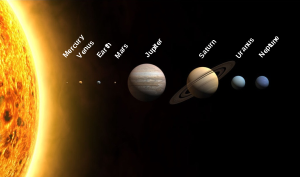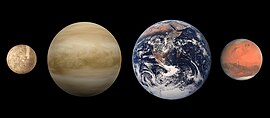Planet: Celestial body directly orbiting a star or stellar remnant
A planet is a large object such as Venus or Earth that orbits a star.
Planets are smaller than stars, and they do not make light.
Jupiter is the biggest planet in the Solar System, while the smallest planet in the Solar System is Mercury.
Planets are shaped like a slightly squashed ball (called a spheroid). Objects that orbit planets are called satellites. A star and everything which orbits it are called a star system.
There are eight planets in the Solar System. Pluto used to be called a planet, but in August 2006, the International Astronomical Union decided it was a dwarf planet instead. There are four more known dwarf planets in the Solar System, Ceres, Makemake, Eris and Haumea.
The name "planet" is from the Greek word πλανήτης (planetes), meaning "wanderers", or "things that move".
Until the 1990s, people only knew the planets in the Solar System. Since then 4,905 extrasolar planets (exoplanets) have been discovered in 3,629 planetary systems (January 2022 data). The count includes 808 multi-planetary systems. Known exoplanets range in size from gas giants about twice as large as Jupiter down to just over the size of the Moon. About 100 of these planets are roughly the size as Earth. Nine of these orbit in the habitable zone of their star.
Origin of the planets
The planets are made of elements that are very different from the Sun (which is mostly hydrogen). The Sun is mostly made up of hydrogen, with some helium. Its energy comes from converting hydrogen to helium. In contrast, the planets are mostly made up of larger atoms and molecules which could not have come from the Sun. The materials of planets must have come from another source or sources. Those sources were atoms made in earlier supernovae explosions near the Sun's path as it moved through its part of the Milky Way. The material captured by the Sun's gravity formed the planets. The same thing happened in other planetary systems in the galaxy.
The gas giants are made up of hydrogen gas like the Sun, plus (at their centres) metallic elements like the terrestrial planets.
Historical names

The planets in the Solar System have names of Greek or Roman gods, except for Earth, because people did not think Earth was a planet in old times. However, Earth is occasionally referred by the name of a Roman god: Terra. Other languages, for example Chinese, use different names. Moons also have names of gods and people from classical mythology. The names of the moons of Uranus are from the plays written by Shakespeare.
Planets
Here is a list of planets in the Solar System from the closest to the farthest
| Planet | Symbol |
|---|---|
| Mercury |  |
| Venus |  |
| Earth |  |
| Mars |  |
| Jupiter |  |
| Saturn |  |
| Uranus |  |
| Neptune |  |
Types of planets
There are planets, and smaller objects that also go around the Sun. Some examples of smaller objects are asteroids, comets, and trans-Neptunian objects.
There are three types of planets in the Solar System. They are:
- Terrestrial or rocky: These are planets that are like Earth. They are mostly made up of rocks. They include: Mercury, Venus, Earth, Mars.
- Jovian or gas giant: These planets are mostly made of gas in their outer layers. They all have metallic cores. They include: Jupiter, Saturn, Uranus, Neptune.
- Icy: These planets are mostly made of ice. It includes Pluto. Many objects in the Solar System that are not planets are also "icy". Examples are the icy moons of the outer planets of the Solar System (like Triton).
Related pages
References
This article uses material from the Wikipedia Simple English article Planet, which is released under the Creative Commons Attribution-ShareAlike 3.0 license ("CC BY-SA 3.0"); additional terms may apply (view authors). Content is available under CC BY-SA 4.0 unless otherwise noted. Images, videos and audio are available under their respective licenses.
®Wikipedia is a registered trademark of the Wiki Foundation, Inc. Wiki Simple English (DUHOCTRUNGQUOC.VN) is an independent company and has no affiliation with Wiki Foundation.

